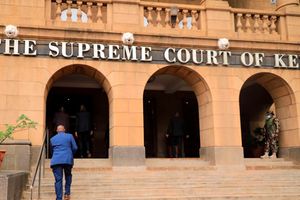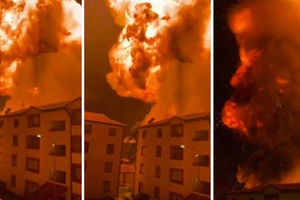
Screengrabs from a user video of the explosion.
Early yesterday, Kenyans woke up to news reports and fiery images of infernal horror following a devastating explosion which caused a widespread tremor, an apocalyptic eastern city skyline of gigantic flame, and extensive devastation in the vicinity of Miradi road, Embakasi in Nairobi.
The extent of injury, loss and damage is yet to be fully accounted, but so far, several deaths and hundreds of serious injuries have been documented.
Damage to property, both public and private, is certainly going to be enormous. Due to no fault of their own, people woke up to a horrendous nightmare straight from the innermost bowels of hell and suffered as they, their loved ones, friends and neighbours were mercilessly consumed by fire, or buried under a collapsing building, or both.
The Miradi road horror was occasioned by the explosion of a tanker filled with liquefied petroleum gas, a flammable blend of hydrocarbon gases, usually stored and transported under immense pressure. A tanker can bear up to 30 metric tons, or over 60,000 litres of the hot stuff and is, in fact, a huge bomb on wheels that should not come anywhere near crowded spaces, narrow passageways, shocks or stresses.
Miradi road is a high-density residential area with perturbingly laissez-faire mixed-use characteristics. By all accounts, it is a horribly ill-conceived spot for staging, loading or disgorging LPG tankers. This is why claims that the LPG gas cylinder filling plant , which was located there, had actually been formally closed and relocated, are plausible. And yet there it was, receiving and dispatching tankers, filling cylinders and exploding in the dead of the night. Either rules were not enforced, or rules were broken with impunity and, whichever way one looks at the matter, corruption is a defining feature of this tragedy.
To understand corruption, one must attempt to lay out an account of its underlying motives and incentives which drive human beings to engage, quite willingly in malignant, antisocial conduct. A traveller desperately desirous of cheaply undertaking displacement between points A and B is likely to board an uninsured ramshackle, possibly with a drunken, unqualified and unlicenced lout at the wheel. Thus are set all necessary conditions for deadly misfortune, and tragic is it most certainly shall be, it is not as accidental as common parlance is wont to frame it.
Business efficiency, the holy grail of strategy, employs myriad tools to strike maximum returns at minimum cost. Quality, health and safety assurance measures are more often than not viewed as onerous costs that should be discarded whenever possible in the quest for profit. Consumers and the public pay for this dearly, and the whole debacle is chalked off as yet another accident. Only robust regulation, scrupulously designed and rigorously enforced, can spare us collapsing buildings, road carnage and other accidents which inevitably arise at the conjunction of corruption and greed.
We frequently underestimate the fanatical devotion of capitalism to the cause of efficiency, even unto the deadliest of extents, and the ends to which businesses will resort to maximise returns. In the absence of regulation, the public is endangered, as consumers and disinterested bystanders fall prey to dystopian disorder and predatory excess. In any event, regulations are utterly useless in the hands of avaricious and venal officials, who will quickly switch sides at the faintest clink of illicit coin.
To a large extent, contemporary tragedy is nearly always the inevitable consequence of past corruption. It is calamitously disingenuous to assert that corruption is innocuous or victimless, just because its most salient and condign implications are more often than not deferred. Because human actions are prone to error, institutions exist to assure the public that any malevolence inherent in our endeavours is mitigated. Corruption undermines these institutions while escalating the malevolence of human enterprise. Corruption imposes costs that extend far beyond the quantum of the transactional considerations at the point of regulatory compromise, and certainly exceed them by an order of magnitude. The magnitude of a bribe may indeed be impressive, but it certainly pales into Lilliputian obscurity in comparison with the comprehensive havoc wrought by LPG tankers in bustling neighbourhoods.
What we call ‘tragic accidents' are therefore no ore than the present cost of past corruption. This is utterly dismaying, of course, but considering the fact that corruption has proven itself to be a resilient and colossal enterprise with innumerable powerful adherents, we must concern ourselves, in unprecedented earnest, with the future costs of present corruption, and how it will affect the state, define our economy and shape our society.
Let us mourn the victims of tragedy not only because their suffering was avoidable and they are not authors of their misfortune, but also because they have been let down by people who knew, or ought to have known that public safety comes before any other consideration. Let us collectively lament the present cost of past corruption, and worry about the future cost od present corruption.
- Mr Ngéno is an Advocate of the High Court









